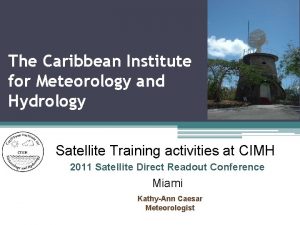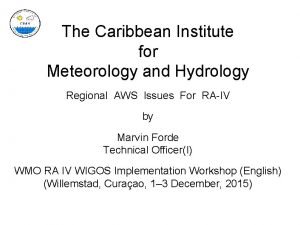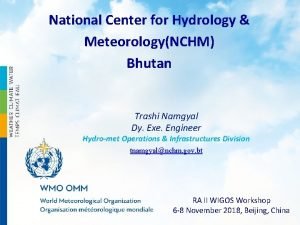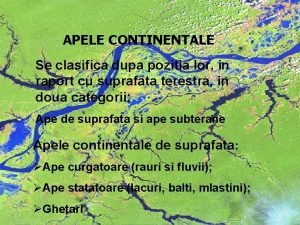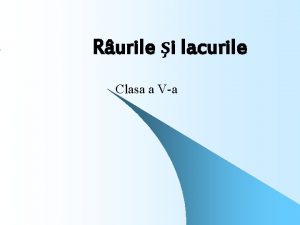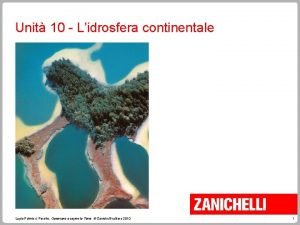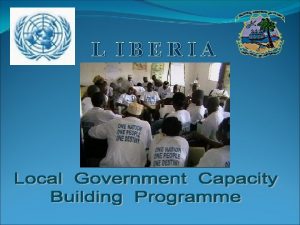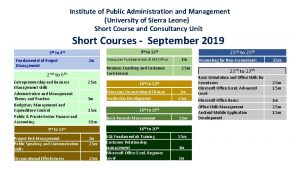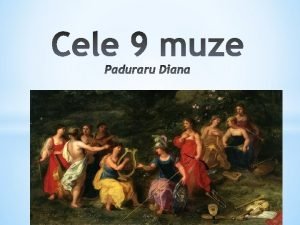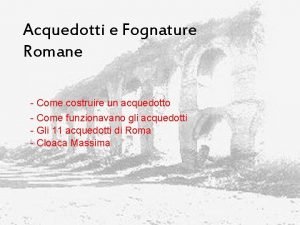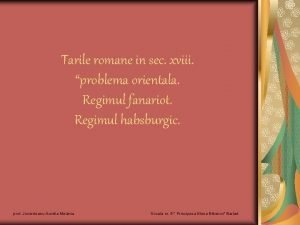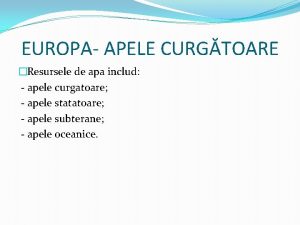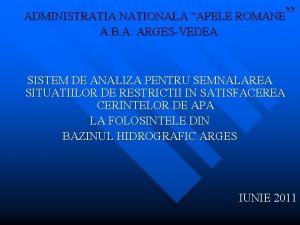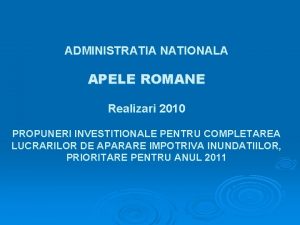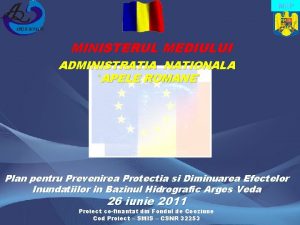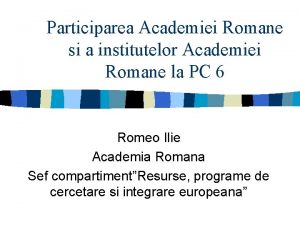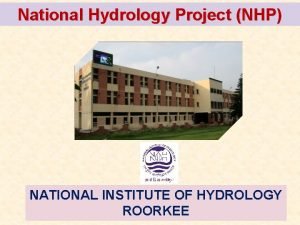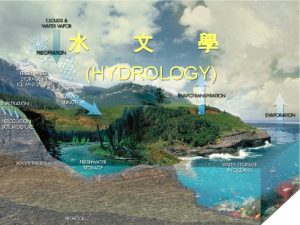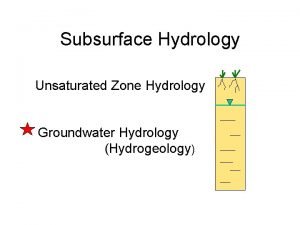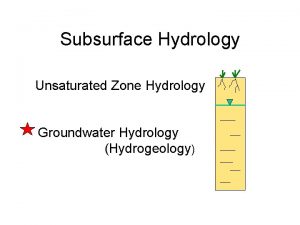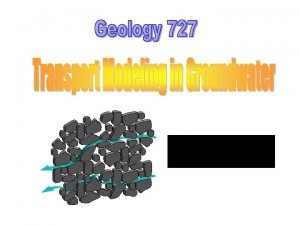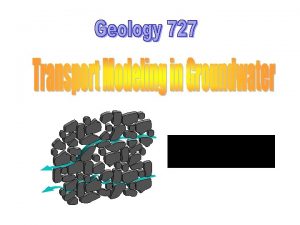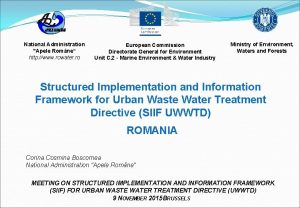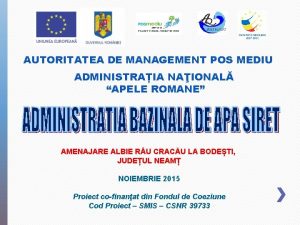NATIONAL ADMINISTRATION APELE ROMANE NATIONAL INSTITUTE OF HYDROLOGY
















- Slides: 16

NATIONAL ADMINISTRATION “APELE ROMANE” NATIONAL INSTITUTE OF HYDROLOGY AND WATER MANAGEMENT TRANSBOUNDARY GROUNDWATER ENVIRONMENTAL PROBLEMS AND THEIR RESOLUTION IN ROMANIA Dr. eng. Mihai BRETOTEAN HEAD OF GROUNDWATER DEPARTMENT

I. CHARACTERISATION OF GROUNDWATERS BODIES (1) As a consequence of the groundwater characterization according to the Water Framework Directive 2000/60 /EC, in Romania there were identified, delimited and described a number of 129 groundwater bodies, from which 20 bodies are at risk (qualitative) and 19 bodies are transboundary Groundwater bodies of Romania

I. CHARACTERISATION OF GROUNDWATERS BODIES (2) From the 19 Romanian transboundary groundwater bodies, through bilateral agreements there were established that being important for a integrated management a number of 8 bodies, as follows: • 4 transboundary groundwater ROMU 20, ROMU 22); • 1 transboundary groundwater • 2 transboundary groundwater • 1 transboundary groundwater bodies with Hungary (ROSO 01, ROSO 13, body with Serbia (ROBA 18); bodies with Bulgaria (RODL 04, RODL 06); body with Moldova Republic (ROPR 05). From the 8 important identified transboundary groundwater bodies, 6 belong to the porous-permeable type (stored in Quaternary, Pannonian and Sarmatian deposits) and 2 of them belong to the fissural-karstic type (developed in Sarmatian and Upper Jurassic – Lower Cretaceous formations).

I. CHARACTERISATION OF GROUNDWATERS BODIES (3) Transboundary groundwater bodies with bilateral agreements

I. CHARACTERISATION OF GROUNDWATERS BODIES (4) Characteristics of transboundary groundwater bodies with bilateral agreements

II. GROUNDWATER MONITORING IN ROMANIA (1) A. National Hydrogeological Network 1. For phreatic aquiferous strata (until 20 – 50 m) • hydrogeological stations types: - Ist order (aim: surveying of connection between groundwaters and surface waters): transversal alignments of wells (2 – 15) on the main surface water courses, situated at the distance of 15 – 20 km between them (located in floodplains and terraces) - IInd order (aim: surveying of groundwaters regime relative to climatic factors): isolated wells (1 – 2) located in interfluve areas of plains, with a density of 1 well/ 20 km 2 - 1 well/ 50 km 2 • achievement period: 1960 – 1972 • total number of achieved wells – ca. 5. 500, from which in observation: - for levels and temperatures – ca. 4. 000 - for water quality – ca. 1. 200 • measurements program: - levels and temperatures - at each 3 days - samplings and analyses – twice/ year (at minimum and maximum levels) - analyzed indicators – 22 (general and of pollution – NO 3, NO 2, NH 4 etc. )

II. GROUNDWATER MONITORING IN ROMANIA (2) 2. For depth aquiferous strata (50 – 400 m) • location: unknown areas for depth aquifers of strata • achievement period: 1970 – at present • total number of wells: ca. 500 • measurements program: - levels and temperatures – once/month - samplings and analyses – once/ 2 – 3 year - analyzed indicators – 22 (general and of pollution – NO 3, NO 2, NH 4 etc. ).

II. GROUNDWATER MONITORING IN ROMANIA (3) The National Hydrogeological Network

II. GROUNDWATER MONITORING IN ROMANIA (4) B. Local Monitoring Networks a. Objectives and wells types: • local surveying of water quality (pollution) evolution in case of some pollutant objectives (factories, wastelands etc. ), by wells for phreatic aquiferous strata • surveying piezometric levels evolution in areas of some important groundwater catchments, by wells with depending on catched aquifer b. Responsibles: owners of pollutant objectives or groundwater catchments

III. AGREEMENTS /PROJECTS CONCERNING IMPORTANT TRANSBOUNDARY GROUNDWATER BODIES (1) A. Agreements B. C. There were achieved bilateral agreements with Hungary, Serbia, Bulgaria and Moldova Republic concerning the important groundwater D. bodies, which aimed: • establishment of the transboundary groundwater bodies considered that being important (with areas exceeding 4000 km 2 and /or important for water supplying); • harmonization of the important transboundary groundwater bodies characterization between neighboring countries; • elaboration of the Roof Report taking into account achieved agreements and transmission of this report to ICPDR Vienna.

III. AGREEMENTS /PROJECTS CONCERNING IMPORTANT TRANSBOUNDARY GROUNDWATER BODIES (2) B. Projects (1) There were initiated common projects concerning transboundary groundwater bodies, as follows: 1. with HUNGARY, concerning: • GWB ROSO 01 and ROSO 13, the project entitled “NATO Sf. P 973684 – SQUASH (Somes /Szamos Quantitative and Qualitative Study of the Hydrogeology)”, in 2001 – 2004 period (with participation of University of Liege - Belgium); • GWB ROMU 20 and ROMU 22, the project entitled “Evaluation of the groundwater resources of the Mures river alluvial fan through mathematical modeling”, project in initial phase, following to be achieved in 2005 – 2007 period, approved by Hydrotechnical Romanian /Hungarian Commission.

III. AGREEMENTS /PROJECTS CONCERNING IMPORTANT TRANSBOUNDARY GROUNDWATER BODIES (3) B. Projects (2) 2. with BULGARIA, concerning : • GWB RODL 04 and RODL 06, the project entitled “Integrated Management of Transboundary Groundwater between Bulgaria and Romania in Dobrogea Area”, project proposed for approval, following to be achieved in 2006 – 2007 period, financed from PHARE funds.

III. AGREEMENTS /PROJECTS CONCERNING IMPORTANT TRANSBOUNDARY GROUNDWATER BODIES (4) Generally, the common projects take into account the following objectives: • evaluation of the groundwater resources from quantitative and qualitative point of view; • projection of a monitoring system with information changings; • establishment of some protection necessary measures of the groundwater bodies; • promotion of a sustainable integrated water management based on a long-term protection and wise use of available water resources; • development the capacity of water authorities relative to establish sustainable groundwater management - assessment, monitoring, exploitation and protection.

IV. NECESSARY MEASURES FOR SUSTAINABLE MANAGEMENT, INCLUDING TRANSBOUNDARY GROUNDWATER BODIES (1) A) Common measures: • Analysis of monitoring wells national network and redimension of this network according to specific requests, especially in case of the risk and transboundary groundwater bodies; • Endowment of wells national network with measuring and possibly data transmission apparatus (quality data type for indicators requested by Water Framework Directive and which have presented in case of Romania the highest frequency: NH 4, NO 2, NO 3, electric conductivity etc. ); • Institution intensification of protected areas; • Monitoring wells placement for evolution determination in time of piezometric situation concerning the main catchments; • Implementation of appropriate agricultural practice for environment protection, including groundwater; • Initiation of a educative national program for groundwater and generally environment protection.

IV. NECESSARY MEASURES FOR SUSTAINABLE MANAGEMENT, INCLUDING TRANSBOUNDARY GROUNDWATER BODIES (2) B) Special measures for risk groundwater bodies status improvement: • Ceasing pollutions which have generated proved impacts and the decreasing of anthropic pressures which constitute potential impacts for groundwater bodies; • Achievement of monitoring local network of groundwater quality from the areas of objectives with high pollution level /risk; • Implementation of some techniques of remediation of polluted groundwater bodies.

THANK YOU FOR YOUR ATTENTION!
 Caribbean institute for meteorology and hydrology
Caribbean institute for meteorology and hydrology Caribbean institute for meteorology and hydrology
Caribbean institute for meteorology and hydrology National center for hydrology and meteorology
National center for hydrology and meteorology Apele continentale cuprind
Apele continentale cuprind Numeste 5 tipuri de lacuri
Numeste 5 tipuri de lacuri Apele continentale
Apele continentale Elementul apa
Elementul apa Reflexia totala aplicatii
Reflexia totala aplicatii Cum merge racul
Cum merge racul Lipa liberia
Lipa liberia Institute of public administration and management
Institute of public administration and management Pianta insula romana
Pianta insula romana Thalia muza
Thalia muza Come costruire mappe concettuali
Come costruire mappe concettuali 1457 in cifre romane
1457 in cifre romane Acquedotti e fognature romane
Acquedotti e fognature romane Regimul fanariot in tarile romane
Regimul fanariot in tarile romane
